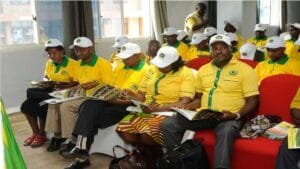JSS Teachers Seeking Autonomy from Primary Schools in Kenya
Introduction
The educational landscape in Kenya has witnessed significant changes over the years, particularly with the introduction of the Junior Secondary School (JSS) structure. The JSS is typically designed for students aged 12 to 14, serving as a critical transitional phase from primary education to secondary schooling. This system is tightly integrated within primary schools, often sharing resources, management, and, at times, curricula with their primary counterparts. This integration aims to provide a seamless educational experience, yet it has created an environment where JSS teachers frequently feel constrained under primary school management.
In recent times, there has been a growing movement advocating for the autonomy of JSS teachers from primary school administrations. This advocacy stems from various challenges experienced by JSS educators, including a lack of decision-making power and the limited ability to tailor educational practices to meet the specific needs of junior secondary students. The JSS curriculum requires a distinct approach, which is often overlooked in a primary school context. Teachers argue that without the proper autonomy, they cannot deliver the education standards expected of them, nor can they fully address the diverse learning needs of their students.
The issues surrounding these calls for greater autonomy are interconnected with the regulatory framework enforced by the Teachers Service Commission (TSC). The TSC plays a significant role in overseeing teaching standards and policies in Kenya. As advocates for autonomy push for reforms, understanding the TSC’s position is crucial for navigating potential solutions that can benefit both JSS teachers and their students. This section lays the groundwork for a comprehensive investigation into the challenges faced by JSS teachers, the implications of their integration within primary schools, and the conversations surrounding their quest for autonomy in the Kenyan educational system.
Challenges Faced by JSS Teachers
Junior Secondary School (JSS) teachers in Kenya encounter a myriad of challenges that impede their effectiveness and professional identity. One of the primary issues revolves around identity, as these educators navigate the ambiguous boundaries between primary and junior secondary education. Unlike teachers in established secondary schools, JSS teachers often find themselves in a unique position where their roles and responsibilities overlap with those of primary school educators. This lack of clear identity can create confusion, not only among the teachers themselves but also among students and parents, leading to challenges in establishing authority and curriculum coherence.
Furthermore, the heavy workload is another significant concern for JSS teachers. Many are tasked with managing multiple subjects and classes, often stretching their capacities thin. The overlapping responsibilities with primary school teachers exacerbate this situation, making it difficult to allocate sufficient time and resources to each student’s unique needs. This duality of responsibilities often leads to a situation where JSS teachers are unable to focus on the specialized educational experiences that junior secondary education requires.
In addition to workload and identity issues, JSS teachers are also confronted with insufficient resources and inadequate support from the education system. Many educational institutions are ill-equipped to provide the necessary teaching materials or professional development opportunities critical for enhancing the quality of education. This lack of resources can lead to disengagement and frustration among educators, ultimately affecting student performance.
The intersection of these challenges indicates a pressing need for a reevaluation of the current education structure in Kenya. By addressing the identity issues, workload pressures, and resource inadequacies faced by JSS teachers, the educational authorities can create a more supportive environment that allows for effective teaching and learning in junior secondary schools.
TSC’s Role in Managing JSS Teachers
The Teachers Service Commission (TSC) plays a pivotal role in the management and oversight of Junior Secondary School (JSS) teachers in Kenya. As the primary body responsible for staffing and regulating educators within the country, the TSC’s involvement in the recruitment and placement of JSS educators is essential for ensuring that schools have qualified personnel who meet the educational standards set by the government.
One of the significant challenges facing JSS teachers is the current representation structure within the education system. Many educators feel that their voices are not adequately represented in decision-making processes, leading to concerns about their professional welfare. This lack of representation can hinder the commission’s ability to respond effectively to the unique needs of JSS teachers. Consequently, increased engagement and consultation with JSS educators are vital for fostering a supportive environment where their concerns can be addressed.
Furthermore, there are growing calls for separate remuneration for JSS teachers to recognize the unique demands of their roles. The TSC must reconsider its compensation structures to ensure that JSS teachers receive equitable pay in line with their qualifications and responsibilities. Fair remuneration is an essential element of job satisfaction and motivation, influencing teachers’ commitment to their profession and the overall quality of education delivered in JSS institutions.
Additionally, the TSC is responsible for ensuring that JSS teachers receive the necessary support and resources to excel in their roles. This includes the provision of professional development opportunities, access to teaching materials, and a conducive working environment. By prioritizing these aspects, the TSC can significantly enhance the teaching experience for JSS educators and foster an atmosphere conducive to effective learning.
In conclusion, the TSC’s role in managing JSS teachers is multifaceted, involving recruitment, representation, and improvement of working conditions. By actively addressing these areas, the commission can elevate the status of JSS teachers, contributing to the overall enhancement of education quality in Kenya.
Arguments for Autonomy
The call for autonomy among JSS teachers in Kenya is grounded in several compelling arguments that highlight the need for a distinct governance structure. One of the primary arguments revolves around the unique curriculum demands faced by JSS, which necessitate a tailored approach to management and delivery. The current integration within the primary school framework often stifles the creative and pedagogical flexibility inherent to the junior secondary curriculum. Autonomy would provide the necessary freedom to design and implement a curriculum that caters to the specific developmental needs of adolescents, ultimately enhancing educational outcomes.
In addition to curriculum considerations, another significant argument emphasizes the necessity of appropriate resource allocation. JSS teachers advocate that with distinct governance, resources can be allocated more effectively, ensuring that the unique needs of junior secondary students are met. This differentiation is crucial in allowing schools to access specialized teaching materials, programs, and training that are aligned with the advanced educational standards required at this level. Current structures may lead to misallocation of resources, where JSS are deprived of necessary tools, ultimately impacting the quality of education delivered.
Furthermore, proponents of JSS autonomy are calling for a review of existing education policies by the Ministry of Education and the Teacher Service Commission. Such a review would facilitate a transformation of the organizational framework governing schools. By establishing a dedicated governance structure for JSS, the education system could cultivate an environment that fosters innovation and excellence. Emphasizing the need for optimized educational practices, advocates believe that restructuring school management will pave the way for a more favorable learning atmosphere conducive to the growth and development of students.







